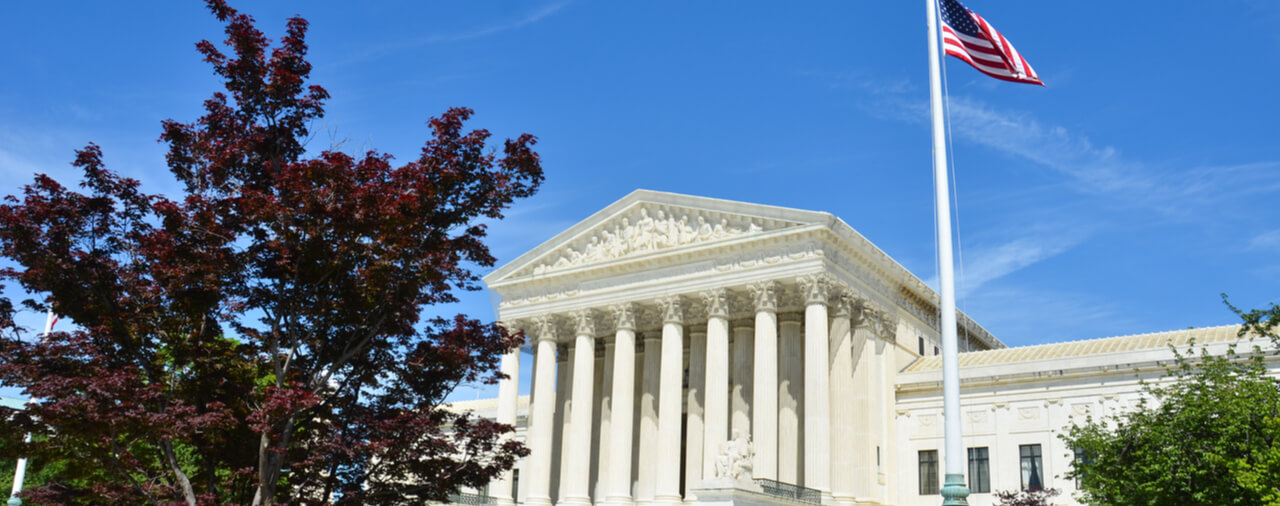Two Important Supreme Court First Amendment Decisions
Introduction
On June 19, 2017, the Supreme Court of the United States released a flurry of decisions as the term came to a close. In this post, I will examine in brief two interesting First Amendment cases that are not related to immigration law. The two cases are Matal v. Tam, 582 U.S. __ (2017) [PDF version], and Packingham v. North Carolina, 582 U.S. __ (2017) [PDF version]. Please follow our site closely for information on likely upcoming Supreme Court decisions that directly implicate immigration issues.
Matal v. Tam, 582 U.S. __ (2017)
Matal v. Tam concerned an Asian rock group that attempted to trademark the name “THE SLANTS” for the band. The Patent and Trademark Office (PTO) denied the application for the trademark, citing to a provision of the Lanham Act, codified at 15 U.S.C. 1052(a) [PDF version]. The provision prohibits the registration of trademarks that may disparage or bring into contempt or disrepute any persons living or dead. The United States Court of Appeals for the Federal Circuit ruled in favor of Tam, finding that the disparagement clause was unconstitutional under the Free Speech Clause of the First Amendment [PDF version]. The Supreme Court took the case on appeal from the Federal Circuit decision.
Eight members of the Supreme Court considered the case, with Justice Neil Gorsuch sitting out due to the fact that he was not yet on the Court when it was argued.
All eight Justices agreed that the disparagement clause was unconstitutional under the First Amendment. However, there were multiple opinions that evinced distinctions in the reasoning of some of the justices.
The opinion of the Court was authored by Justice Samuel Alito. Parts I, II, and III-A of his decision commanded a majority of the justices. In parts I and III-A, he was joined by his seven colleagues, and in part II he was joined by every justice except for Justice Clarence Thomas (part II was not central to the Court's ruling on the First Amendment issue). The key point in Justice Alito's opinion of the court is that the justices found that the disparagement clause violates the free speech clause. In so finding, the Court rejected the Government's argument that trademarks are government speech and thus subject to more regulation. Rather, the Supreme Court took the position that trademarked speech is private speech, and the conferral of a trademark does not make it government speech.
The Court split into blocs of four justices regarding the reasoning.
Justice Alito was joined for parts III-B, III-C, and IV of his decision by Chief Justice John Roberts and Justices Clarence Thomas and Stephen Breyer. Justice Alito took the position that the disparagement clause could not be sustained under the Court's government-speech and government subsidies cases or under the Government's proposed “government-program” doctrine. Justice Alito found that the question of trademarks did not fall within any of these categories.
Justice Anthony Kennedy filed a concurring opinion joined by Justices Ruth Bader Ginsburg, Sonia Sotomayor, and Elena Kagan. They took the position that the disparagement clause constituted impermissible viewpoint discrimination under the First Amendment and that, accordingly, it was not necessary to reach any other questions presented in the case.
Justice Thomas wrote a concurring opinion explaining that he did not join part II of Justice Alito's opinion because the issue of whether commercial speech was subject to “strict scrutiny” or, as Justice Alito concluded, “intermediate scrutiny” review was, in his view, not presented. Justice Thomas took the position that strict scrutiny applies to all government restrictions of truthful speech regardless of whether the speech can be characterized as “commercial” However, Justice Thomas stated that he joined in Part IV of Justice Alito's opinion, holding that the disparagement clause was unconstitutional even under a less stringent test.
Analysis
In Matal v. Tam, the Supreme Court correctly struck down a ridiculous statute that had been on the books for over 70 years. Government approval of a trademark request does not transform the trademarked speech into government speech. Rather, it is private speech with trademark protection.
The Court made clear that the Government does not have the authority to ban or otherwise restrict speech on the basis that it may offend a group or subset of a group of individuals. For all of the law's allegedly good intentions, both concurring opinions by Justice Alito and Justice Kennedy noted that the law does not even accomplish the nevertheless impermissible objective of restricting only speech that a significant number of people would likely find offensive. Justice Alito noted that the law is so sweeping that it would encompass denunciations of slavery, for it covers both the living and the dead. Justice Kennedy noted that the law could very easily be turned against minority and dissenting views.
The Tam decision is a victory for the principle of free speech and free expression. As I discussed on a blog from 2016, the remedy to speech that one does not like is more speech [see blog].
Packingham v. North Carolina, 582 U.S. __ (2017)
Packingham concerned a North Carolina statute that prohibited registered sex offenders from accessing any commercial networking web site where the sex offender knows that the web site permits minor children to become members or to create or maintain personal web pages. The statute in question is N.C. Gen. Stat. Ann. Sections 14-202.5(a), (e). The case was taken on appeal from a decision by the North Carolina Supreme Court upholding the law.
All eight justices (minus Gorsuch) agreed that the law violated the First Amendment and was, therefore, invalid. Similarly to Tam, the justices did not all agree on the analysis. However, in Packingham, the majority opinion had five justices on each point.
The opinion of the Court was authored by Justice Kennedy, who was joined by Justices Ginsburg, Breyer, Sotomayor, and Kagan. Justice Kennedy found that the statute was overbroad. He noted that the Court must be careful in finding that the internet is not subject to robust First Amendment protection. Justice Kennedy held that the statute's prohibition was unprecedented in the scope of the First Amendment speech it burdened. He noted that registered sex offenders may rely on the internet for staying abreast of current events, finding employment, and accessing information. He found that the breadth of the restrictions prevented sex offenders in North Carolina from legitimately exercising their First Amendment rights. In a key point, Justice Kennedy found that North Carolina did not sustain its burden of showing that the scope of the law was necessary or legitimate in serving its purpose of keeping sex offenders away from children.
Justice Alito wrote an opinion concurring in the judgment only and was joined by Chief Justice Roberts and Justice Thomas. Justice Alito agreed with the majority that, because of the law's “extraordinary breadth,” it violated the First Amendment. However, Justices Alito, Roberts, and Thomas declined to join the majority opinion because of its “undisciplined dicta.” Justice Alito criticized the majority for equating the internet “with public streets and parks.” Furthermore, he took issue with the fact that the majority opinion would preclude the state from enacting more narrowly tailored restrictions, such as those preventing sex offenders from visiting teenage dating sites or sites designed to help minors discuss problems with their peers. In short, Justice Alito agreed with the result as applied to the specific statute, but he took issue with the scope of the majority opinion. He argued that the Court “should proceed circumspectly” regarding the internet. He listed several issues particular to sex offenders using the internet that may justify more narrowly tailored restrictions in a different case.
Analysis
The Court was correct in Packingham in finding the North Carolina statute unconstitutional. While it is likely that few among us would argue that protecting minors from sex offenders is a valid state interest, restrictions must be very carefully and narrowly tailored when they implicate basic constitutional rights. It is telling that both Justice Kennedy and Justice Alito found that the North Carolina statute was overbroad despite Justice Alito seeming to be more open to the idea of restrictions placed upon the speech of sex offenders in different cases. Without a doubt, the Supreme Court will be litigating complicated cases involving the internet in a variety of contexts for years to come. However, in Packingham, the Court wisely struck down a statute that restricted speech on the internet indiscriminately.
Although Packingham is not an immigration case, it is worth noting that we have several articles on important issues involving sex offenses and the immigration laws. For some examples, please see our articles on deportability for failure to register as a sex offender [see article], the Adam Walsh Act [see article], and the Supreme Court's recent decision on statutory rape in the immigration aggravated felony context [see article].

- Alexander J. Segal's blog
- Log in to post comments
